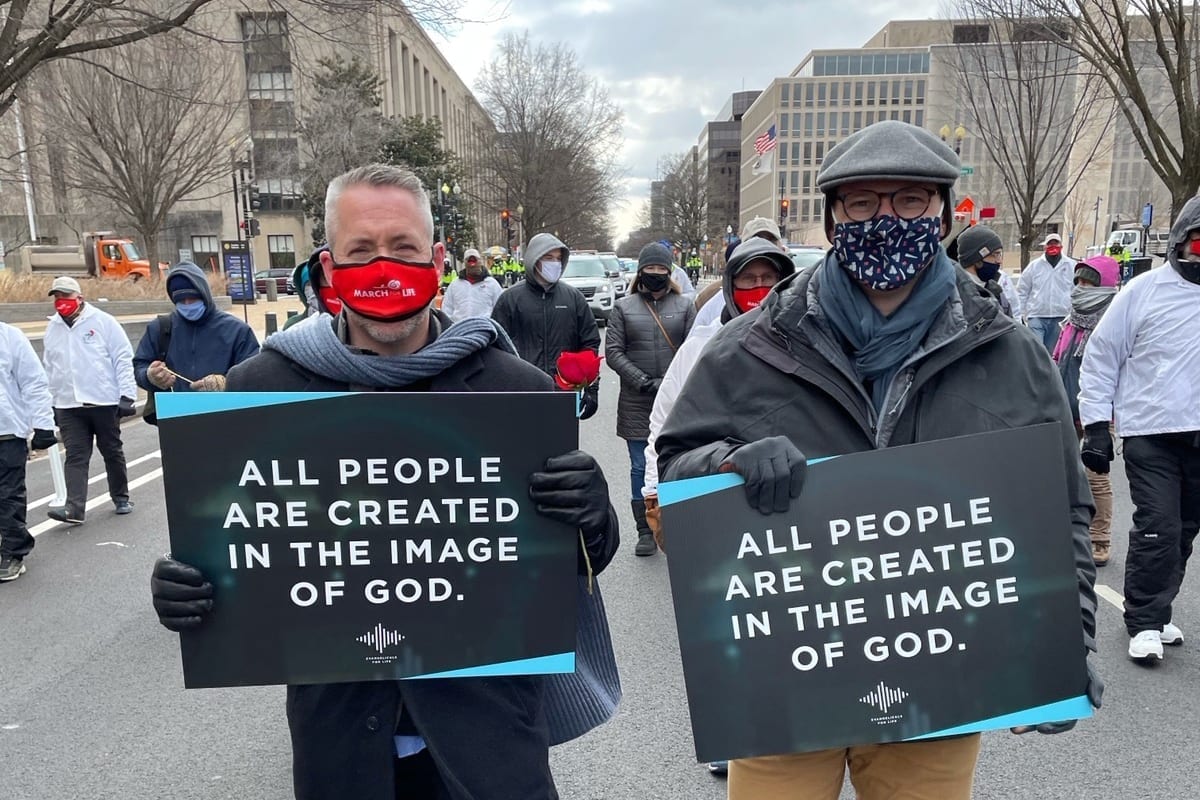
Evangelicals for Life 2021 virtual event
Transformation, vulnerability and collaboration are vital for Christians in the pro-life movement, speakers said at the Southern Baptist-sponsored Evangelicals for Life conference Jan. 28.
The Ethics & Religious Liberty Commission (ERLC) hosted Evangelicals for Life (EFL) for the sixth consecutive year, this time in a virtual format via live streaming because of the COVID-19 pandemic. Held on the day before the annual March for Life, EFL 2021 focused on the future of the pro-life movement and included the announcement of a new ERLC initiative in preparation for the 50th anniversary of the Jan. 22, 1973, Roe v. Wade decision that legalized abortion in all states.
The ERLC plans for “The Road to Roe50” to be a cooperative effort to unify the pro-life movement, train a new generation of leaders and prepare for a “post-Roe world” that will culminate in a “once-in-a-lifetime” event in Washington, D.C., Elizabeth Graham told the online EFL audience. She is the ERLC’s vice president of operations and life initiatives.
In the keynote address of Thursday’s conference, ERLC President Russell Moore said “the transformation of the heart has to be at the center point of everything that we do in terms of advocacy for human life and human dignity.”
“Why? Because there is a tendency in every fallen, human heart to say who is worthy of life and dignity and who is not. And when we do that, we’re putting ourselves in the place of a god, not in the place of a creature,” Moore said. “[Y]ou cannot be pro-life with the attitude of seeing some vulnerable human beings and not seeing others.”
Some, however, may want to talk about unborn children but not racial justice, or racial justice and not unborn children or the poor and not immigrants or immigrants and not the lonely elderly, he said.
Christians resist “a culture of violence and death” by vulnerability, Moore said. “We’re willing to risk. We’re willing to give up our own lives. … What we are offering to God is what Romans 12 calls a ‘living sacrifice,’ our own lives, because in the gospel we are forgiven, and we then offer, on behalf of Christ, forgiveness.”
That means some in the audience will serve a pregnant woman in crisis, work at a pregnancy resource center, spend time with an Alzheimer’s patient, live among the poor or provide a home for foster children, Moore said.
“And we have solidarity with all of those who are vulnerable and are in need of our love, our mercy, our care, our compassion, our advocacy, our concern,” he said in remarks based on the account of Cain and Abel in Genesis 4. “Our response is not: ‘Am I my brother’s keeper?’ Our response is not: ‘Who is my neighbor?’ Our response is to say, ‘God, who have you brought into my orbit, and what is it that you are requesting from me to image You in this situation?’ That’s the only way to stand for life. That’s the only way to stand for dignity – through obedience, vulnerability and, above all, the gospel of Jesus Christ.”
Lauren McAfee, corporate ambassador for Hobby Lobby, said evangelical pro-lifers “need a robust understanding” of the biblical teaching that every human being is made in the image of God and is a recipient of His common grace to produce “a more compelling movement” characterized by integrity or consistency and cooperation.
“When we don’t apply our convictions consistently, we lose our credibility,” she said. “Our understanding of mankind created in God’s image applies to everything we do. Showing consistency in our convictions about human dignity applies to all. Applying that to all doesn’t weaken our argument against abortion. It actually strengthens it. It gives us a compelling picture of valuing all of life.”
The Bible shows God’s redemptive work “is intended to be done in collaboration or partnership with others,” McAfee told the audience. “A more connected and collaborative movement will be a … more powerful movement. This will create an incredible impact.”
Benjamin Watson, a former tight end in the National Football League who has collaborated with the ERLC through its Psalm 139 project to place ultrasound machines in pregnancy resource centers, said the image of God in every person, as well as the gospel, affect how Christians act as pro-life advocates.
“[W]e truly need to understand that our goal and our purpose in our pro-life movement is not necessarily only to save these preborn children, but ultimately it’s to point people to Christ,” Watson said, adding:
“[W]e must never lose sight of the fact that the person that we are so vehemently against is still a creation of God and is still a potential brother [or] sister in Christ if we exude the grace and the mercy as well as the conviction that God will call us to give,” he said. “[W]e fight for image bearers, but also we want to show people the gospel.”
In a panel discussion on public policy, ERLC Policy Director Chelsea Sobolik acknowledged “there’s little that we can do to advance pro-life policies” with the Democratic Party, which strongly supports abortion rights, in control of the White House and Congress.
The ERLC’s focus in the new congressional session will be “holding a line and making sure that historic pro-life riders” to spending bills are maintained, she said. These include the Hyde Amendment, which prohibits Medicaid funding of abortions.
“We think that these [pro-life policies] should not be partisan,” she said. “Unfortunately, they’ve become partisan, but we are going to make the case they shouldn’t be.”
In many states, however, it is a different matter, said Steven Aden, chief legal officer and general counsel of Americans United for Life.
“The climate for protecting life in the states has actually never been better,” Aden told participants. States have enacted hundreds of pro-life laws for more than a decade, and courts have dismissed many of the challenges from abortion rights advocates, he said, adding pro-life legislators are “very animated and energized to protect life through legislation.”
Denise Harle, senior counsel for Alliance Defending Freedom, said pro-life advocates “have every reason to be hopeful” regarding the Supreme Court.
Even before Associate Justice Amy Coney Barrett, who is considered a conservative, was added, the high court issued a “gut-punch decision” by invalidating a Louisiana pro-life law in June, but the controlling opinion turned out to be “sort of a gift in disguise,” Harle said. In that concurring opinion, Chief Justice John Roberts “knocked down some of the abortion advocates’ arguments over the past several years” and said “states can regulate abortion so long as it’s reasonably related to a legitimate purpose,” and “that does give states a lot of leeway,” she said.
Regarding “The Road to Roe50,” Graham told participants “We believe this unified call to action … has the ability to strengthen pro-life convictions and enhance pro-life engagement.”
Graham asked each person watching to commit his or her pro-life community of friends, church members and others to take part in “The Road to Roe50,” establish a team to lead the community’s efforts and pray, including that abortion would “not just become illegal but that it would be unthinkable.”
The EFL talks may be viewed below.
(EDITOR’S NOTE – Tom Strode is Washington bureau chief for Baptist Press.)

